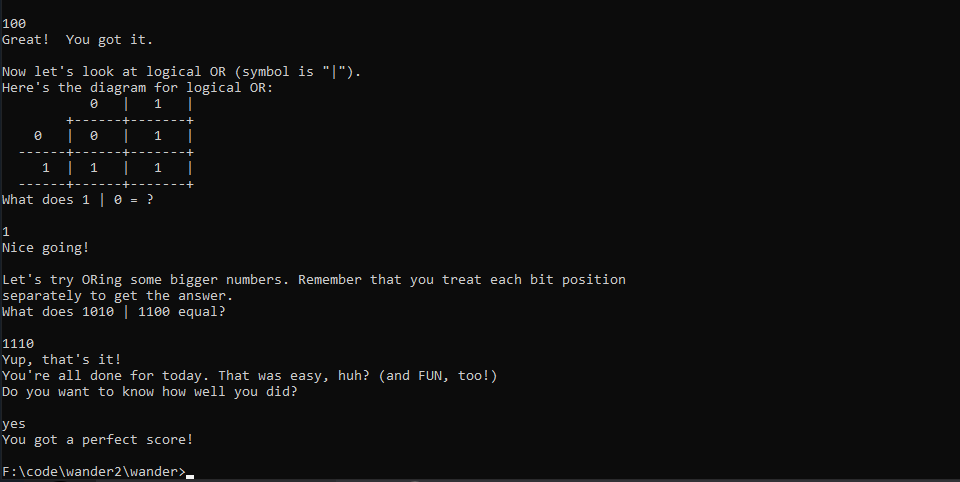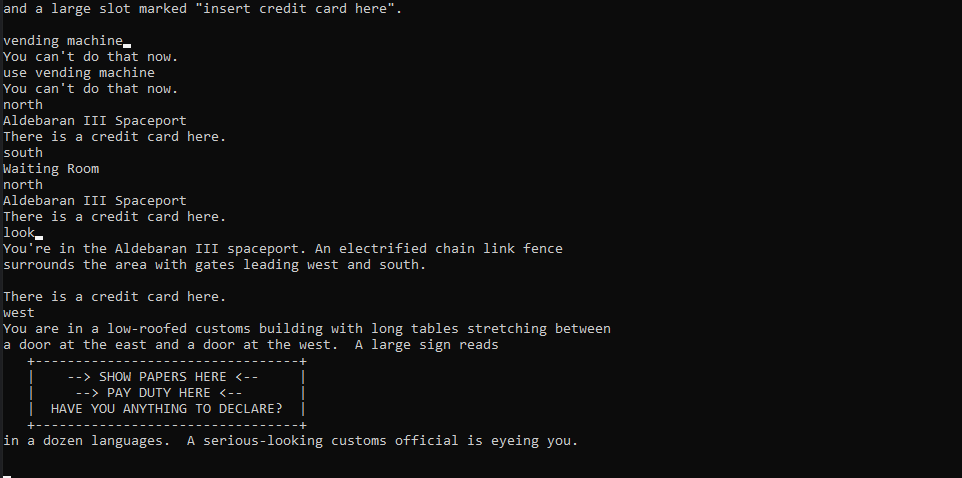Originally Added: November 7, 2025
Last Updated: November 7, 2025
1974 - Wander
Hello, 1974. I picked Wander for this year, an early text adventure. Pickings are still pretty slim this far back. My choices for this year were a bunch of early arcade games and a bare handful of mainframe stuff. The arcade games would be interesting to cover, but most of them would’ve required a second person to really get the full experience, and I didn’t want to lose out on most of the experience again like with the Odyssey. Maybe I’ll do a multiplayer game for real someday, but not now. Out of the mainframe games, the most interesting to me was Wander, which was not so much a game as an early interactive fiction engine written by Peter Langston. It’s got a few adventures that are more-or-less official, though. At least, they came with the downloads I could find. I completed the default (Aldebaran III), completed the simplest of the others (tut), and got a good sampling of the other two (Castle and Library).
There was one gaming event in 1974 that, sadly, is out of scope for this series. A small publisher out of Wisconsin started selling a new tabletop game, based on earlier wargames but much smaller in scale. Rather than an army, each player would control one character. You almost certainly know what Dungeons & Dragons is already, and you almost certainly also know just how important it’ll be to video games. But not yet.
Getting this game up and running was an adventure in itself. After a long period as lost media (more information on the blog Renga in Blue), the source code is now freely available on Github, but building it on Windows ended up being a hassle I didn’t want to sort out if I could help it because of some incompatibilities. (I’ve got a Linux machine now that would probably have made it a lot smoother, but that didn’t help me at the time.) A bit of poking around found me Renga in Blue and a couple other blogposts about the game, but none of them contained still-active download links with a Windows binary. After a little more searching, I was able to find a working download link on a French IF site and finally play the game. Incidentally, this game is easiest to run from the command line, rather than trying to run the exe out of Explorer. Not an issue for me, but if you’re not experienced with the command line you might want to brush up on the basics.
And the game is… about what you’d expect for an extremely early text adventure. You can move around, look at stuff, pick stuff up, and interact in very narrow ways with a limited number of things. The text parser is surprisingly not the most basic I’ve seen, though I suspect it’s been beefed up slightly at some point since the initial release. For example, if you mistype a command, you get told that commands of two words are accepted, but “pick up X” works fine. (Incidentally, “get X” does not work, making this possibly the first game in which you can’t get ye flask. You can, however, “take” ye flask.) There’s very little to write home about the mechanics even by the standards of purely text games, so on to the worlds, in the order I played them:

I'm so good at really basic binary math. This and all other images on this page are my own screenshots.
tut.wrld
Surprisingly, not a tutorial (not that the game really needs one). This is a short educational program, running the player through a few basic binary operations. It’s by far the smallest and simplest of the included worlds, and is also the only one that isn’t really an adventure. It’s interesting to see the engine repurposed like this, but other than that there’s just not much to say here.
a3.wrld
The default adventure (as in, the one that opens if you start the game from the command line with no arguments), and so the one I played to completion to fulfill my goal. A3 (short for, probably, Aldebaran III) is a sci-fi adventure. You are a junior diplomat, sent to the planet of (no points for guessing) Aldebaran III to somehow avert an expected uprising against humans (aka Terrans). Your boss has somehow managed to get out of town, and the Ambassador is a “classic bungler” and absolutely cannot be relied upon. Good luck, buddy.

This is as good as graphics can get. Look upon it and weep with joy. Also featured: me fighting the parser.
You arrive at the spaceport in the middle of the night and set about exploring the city and getting called sci-fi slurs by its residents. It’s a world that’s definitely got a lot of texture. Basically nobody likes you and they’re willing to let you know. About all you’ve got on your side are a couple scattered Terran sympathizers and a bartender who’ll give you a drink on the house for being a UNIX user (joke’s on him, I played the game on Windows). You can and probably will get lost, ripped off, robbed and even beaten up in a race riot. It’s not clear what cause, if any, there is for the tensions here, and we only get glimpses of the background, mostly in the form of claims about the strangeness of Aldebarani society found in your notes on the planet. There’s a brief mention of a trade treaty negotiated by an Admiral Kurasawa (sic) Perry. Is it supposed to bring to mind the real-life Perry Expedition, where American commodore Matthew Perry threatened Japan into opening diplomatic relations, leading to unequal treaties with Western powers? Is it just a joke or a coincidence? I dunno, man, read into it as much as you want. The game world just isn’t that fleshed out. For what it’s worth, in the end the leader of Aldebaran, the Representative, deactivates androids that were apparently leading the uprising-to-be, but surely that means there were already some feelings to take advantage of? It’s not terribly clear and it’s not terribly important to the game. The goal is to drop you in a weird place and have you fumble your way around it, not to paint a picture of galactic politics.

More of me fighting with the parser. There isn't much "guess the verb" struggling that I ran into, but there was more than zero.
I did enjoy bumbling around the game world, to a point. I’ve never really had the patience for classic interactive fiction, to be completely honest. Every once in a while I’ll load one up, screw around until I run out of obvious things to do, and then go off to play a video game with either graphics or spreadsheets in it. This project has probably committed me to finishing more text adventures than in the rest of my life put together. So don’t take it as too harsh a criticism when I say that this is probably the game I’ve enjoyed least so far. I’m going to try not to hold its format against it too badly. There were a couple puzzles I really liked (the Lumbaga Lane bit in particular) and nothing I outright hated, I just didn’t have much that I loved to grab onto. If you like IF and you want to see more of its early days, you could definitely do worse.
library.wrld
This one’s a little weirder than the last. Long after civilization has ended (how is unclear, all that’s told is that “Chaos had its way with [the world]”), you explore Harvard’s Widener Library. You get a lot less direction than in the last game, mostly left to, well, wander. It’s full of pop culture references, some of which I get and some of which I don’t, and probably also a few jokes about the real-life location it’s based on that I didn’t even recognize as jokes. I get the feeling the author (Nat Howard, the only non Peter Langston author included) was a sci-fi fan. There’s also a shit-ass maze, consisting of a bunch of identical areas in the Folklore and Mythology section that don’t connect in any reasonable way. Gaming’s first shit-ass maze, perhaps. It’s a charming enough place to explore, and I have a feeling I didn’t find all its secrets.

You know what? Just send me back to the maze.
castle.wrld
Despite being the original, this is the one I played the last and the least (except for tut, which is so short that even a cursory look at any of the other worlds would be longer). It’s another one with no clear goal at the start. You are… you, watching TV one night when suddenly you find yourself falling through the TV into a crossroads. There is indeed a castle, though I haven’t been able to get into it. I’ve mostly been unproductively wandering around a landscape, getting lost in the woods (also a shit-ass maze, although less shit-ass than the one in Library) and wondering what kind of unit of measurement a “qwert” is (those familiar with Americans will probably use this as another example that shows we will use literally anything except for the metric system). Honestly, I just didn’t have the energy to push myself through this or Library, especially not even knowing what I my goal was or if there even was a win state. I’m counting completing A3 as my win condition for this one. A peek at the files now that I’ve safely put the game down tells me that both do have a win state, more or less, though what they are is so disconnected from the start that you’d have to find them by coincidence.
On to more general thoughts, then. I think it’s interesting that the majority of the worlds don’t start you with a firm goal. It’s not unheard of for games to leave the player without a goal, but not usually an adventure game with an actual defined end condition. The closest thing now might be Minecraft, but Minecraft is more of a massive sandbox that just happens to have a boss that triggers a credit roll. It definitely lends the game a different atmosphere. While there definitely is a sense of progress in discovering new areas and new things to do, you also feel like you’re, well, wandering.
It’s also neat to see how the genre basically emerged fully-formed. While this game almost certainly didn’t have a large influence on future titles, it still basically contains all the basics you’d expect from its genre. Discrete areas, a set of basic commands including movement, looking around, inventory commands, and interacting with things in the room, a win state and a few different ways to die. It doesn’t have a score, but it does make fun of you for asking for your score. The parser and interface are literally as basic as it gets, but it’s pretty complete within its limitations.
I don’t think I’m going back to complete the adventures I neglected. But that doesn’t mean that I hated the game, just that I don’t love it enough to go through and really scour it while I’ve got so much else out there to try. If you’re more into IF than I am, or if you’re just curious to see some of the earliest stuff out there, give Wander a look. Can’t hurt.